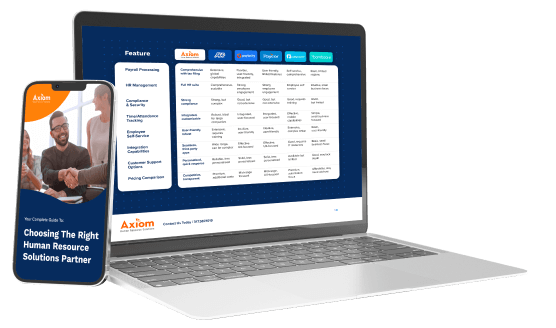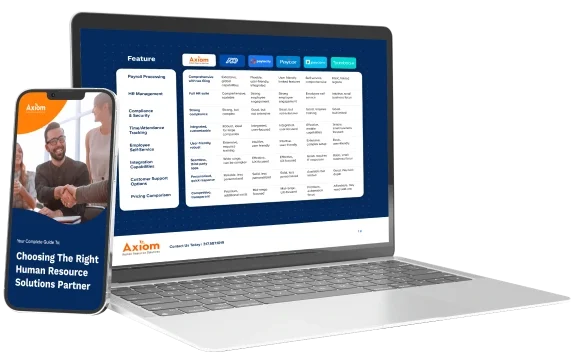
As labor and employment laws evolve, staying up to date on the latest regulatory changes is crucial for businesses to ensure compliance and foster a supportive work environment. The Federal Trade Commission (FTC) and the Department of Labor (DOL) have recently introduced significant updates that impact non-compete agreements, overtime regulations, and independent contractor classifications. This comprehensive guide from Axiom HRS and Bose, McKinney & Evans, LLP will delve into these changes and provide actionable steps for employers to adapt to the new landscape.
1. FTC Ban on Non-Compete Agreements
The FTC has taken a decisive stance against non-compete agreements, deeming them an unfair method of competition under Section 5 of the FTC Act. The proposed rule, announced on January 4, 2023, aims to eliminate non-compete clauses for nearly all employees, arguing that these agreements suppress wages, hinder innovation, and prevent entrepreneurs from starting new businesses.
Key Points:
- Scope of the Ban: Employers will be prohibited from entering into, maintaining, or representing the existence of non-compete agreements with workers. Existing agreements must be rescinded, and affected employees notified.
- Exceptions: The rule does not apply to non-disclosure agreements, client/customer non-solicitation agreements, or other restrictive covenants unless they effectively prevent workers from seeking new employment.
- Legal and Regulatory Context: The FTC received over 27,000 comments on the proposed rule, reflecting its contentious nature. The final vote on the rule was scheduled for April 23, 2024, with implementation anticipated 180 days thereafter.
Actions for Employers:
- Policy Review: Employers should review existing employment agreements to identify and rescind non-compete clauses.
- Notification: Provide clear communication to employees about the changes and their rights under the new rule.
- Alternative Protections: Consider using non-disclosure and non-solicitation agreements to protect business interests without restricting employee mobility.
2. DOL Updated Overtime Regulations
The DOL has introduced a new overtime rule, significantly increasing the salary thresholds for white-collar exemptions under the Fair Labor Standards Act (FLSA). This rule aims to ensure fair compensation for employees performing executive, administrative, and professional duties.
Key Points:
- Salary Threshold Increase: The threshold will rise to $844 per week ($43,888 annually) on July 1, 2024, and further to $1,128 per week ($58,656 annually) on January 1, 2025.
- Highly Compensated Employees: The compensation requirement for highly compensated employees will increase to $132,964 in 2024 and $151,164 in 2025.
- Duties Test: The duties test for exemptions remains unchanged, focusing on the nature of the work performed.
Actions for Employers:
- Compensation Review: Assess current salary levels of exempt employees and adjust as necessary to meet the new thresholds.
- Job Classification: Ensure that job descriptions and duties align with the criteria for exemptions under the FLSA.
- Compliance Planning: Develop strategies to manage potential increases in labor costs, such as reclassifying employees or adjusting bonus structures.
3. DOL Independent Contractor Rule
Effective March 11, 2024, the DOL’s final rule on worker classification restores the multifactor “economic realities” test to determine whether a worker is an employee or an independent contractor under the FLSA. This test evaluates the totality of circumstances, focusing on factors such as the degree of control exerted by the employer and the worker’s opportunity for profit or loss.
Key Points:
- Multifactor Analysis: The rule considers factors like investment in equipment, permanence of the work relationship, and the nature of the worker’s business.
- State Law Variations: Employers must also comply with more stringent state laws where applicable. For example, Indiana law requires that an independent contractor meets specific criteria, including the freedom to perform services for others.
Actions for Employers:
- Classification Audit: Conduct a thorough review of current worker classifications to ensure compliance with the new rule.
- Documentation: Maintain clear documentation of the factors considered in classifying workers as independent contractors.
- Legal Consultation: Consult with legal experts to navigate complex state and federal requirements and avoid misclassification risks.
Practical Steps for Employers
1. Policy and Agreement Updates
Employers should review and update employment agreements, handbooks, and policies to align with the new regulations. This includes eliminating prohibited non-compete clauses, adjusting salary levels, and ensuring proper classification of workers.
2. Employee Communication
Transparent communication is essential to help employees understand their rights and any changes to their employment terms. This includes providing notices about rescinded non-compete agreements and explaining new overtime eligibility criteria.
3. Training and Education
HR personnel and managers should be trained on the new rules and their implications. This ensures consistent application of policies and helps mitigate compliance risks.
4. Monitoring Legal Developments
Stay informed about ongoing legal challenges and updates related to the FTC and DOL regulations. Court decisions may impact the implementation and enforcement of these rules, requiring further adjustments to company policies.
5. Strategic Planning
Develop strategies to manage the financial and operational impacts of the new regulations. This includes budgeting for potential salary increases, evaluating the feasibility of maintaining exempt status for certain roles, and exploring alternative protective measures for business interests.
Streamline Compliance and HR Management with Axiom HRS
Failing to adhere to the latest FTC and DOL regulations can be critically expensive and risky for any business. Managing the day-to-day operations of your business while staying up to date on these changes is a significant challenge, but you can’t afford to take chances with compliance.
Entrust your HR compliance, payroll processing, employee classification, and more to the specialists at Axiom HRS. We are dedicated to the intricate details that keep your business compliant and your operations smooth. Contact us today to discuss solutions tailored to your organization’s needs.



